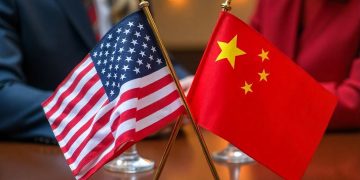The United States has approached China to discuss tariffs imposed during Donald Trump’s presidency, according to a post by Yuyuan Tantian, a social media account affiliated with Chinese state media. The development may signal potential willingness from Beijing to engage in negotiations.
“The US has proactively reached out to China through multiple channels, hoping to hold discussions on the tariff issue,” Yuyuan Tantian reported, citing anonymous sources.
Senior US officials, including Treasury Secretary Scott Bessent and White House economic adviser Kevin Hassett, have expressed optimism about reducing trade tensions. Speaking to CNBC, Hassett described “loose discussions” occurring between both governments and pointed to China’s recent easing of duties on some US goods as a positive sign.
China has publicly criticized the tariffs, arguing that they represent unfair pressure, while simultaneously seeking international support against the measures. However, Beijing has also moved to exempt certain US products—including pharmaceuticals, microchips, and jet engines—from its retaliatory tariffs.
In a separate interview with Fox Business Network, Bessent emphasized the need for de-escalation before formal negotiations can proceed, citing high tariffs of 145% on US imports and 125% on Chinese goods. He suggested initial discussions could focus on revisiting the purchase commitments made under the 2020 “Phase 1” trade agreement, which aimed to increase China’s purchases of American goods but was disrupted by the Covid-19 pandemic.
Bessent indicated that broader issues such as non-tariff barriers and intellectual property protection would also be on the agenda, adding, “Everything is on the table for the economic relationship.”
According to analysis by Nomura Securities, a significant reduction in Chinese exports to the US could have a substantial impact on employment in China, with an estimated 16 million jobs at risk if exports decline by 50%.
Bessent stated that the economic pressure was greater on China, noting that Chinese exports to the US far exceed US exports to China. “Their factories are closing down as we speak,” he said, highlighting the potential effects during the holiday season ordering period.
Despite these pressures, Chinese officials have reiterated that negotiations must be conducted on the basis of equality, respect, and mutual benefit. Yuyuan Tantian’s post cited unnamed experts who emphasized that China would closely observe US intentions before committing to talks.
Earlier, former President Trump said in an interview that discussions with China were ongoing, claiming Chinese President Xi Jinping had contacted him. However, Chinese officials denied that such talks were taking place, accusing the US of “misleading the public.”
Chinese foreign ministry spokesperson Guo Jiakun reiterated that, as of Wednesday, no formal consultations or negotiations had occurred.
While Yuyuan Tantian is not among China’s most authoritative media outlets, reports from such platforms can sometimes hint at shifts in Beijing’s stance. The Global Times, a state-affiliated newspaper, has often reported developments in China’s trade policy before official announcements.
Trump said Wednesday he believed there was a “very good chance” of reaching a deal, while Xi Jinping separately urged Chinese officials to prepare for changes in the global environment, without specifically mentioning the US.
Explore the newest supply chain news at The Supply Chain Report. Visit ADAMftd.com for free international trade tools.
#USTariffs #ChinaTradeTalks #TradeRelations #TariffNegotiations #USChinaRelations #GlobalTradePolicy #ChineseMedia















